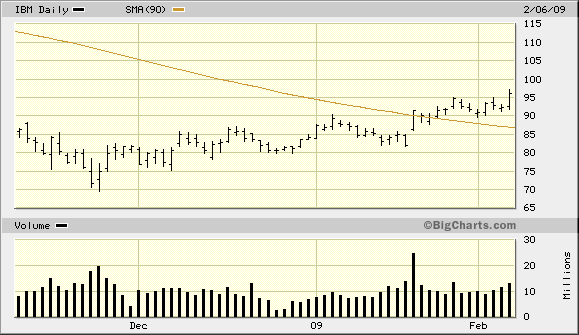A Confidence Crisis, Not a Money Crisis
Stock-Markets / Credit Crisis 2009 Feb 07, 2009 - 09:02 PM GMTBy: Clif_Droke
 “Though the life of a man be short of a hundred years, he gives himself enough anxiety as if he were to live a thousand.” --Ancient Chinese proverb
“Though the life of a man be short of a hundred years, he gives himself enough anxiety as if he were to live a thousand.” --Ancient Chinese proverb
The crisis we keep hearing so much about, which formally began in 2007 and intensified in 2008, was at root a crisis in confidence. True, the credit crisis had its origins in the tight money policy of the Federal Reserve beginning in 2004 and continuing into 2007. So there was definitely a money/credit aspect to the crisis. But more than any single factor – and this has been especially true in the past few months – the crisis has been more about shattered confidence than a dearth of liquidity.
Institutional and retail investors alike are still suffering the spillover effects from a lack of confidence in the financial system. It’s not that they utterly lack capital; they’re simply too afraid to spend it until they see evidence that the bailout and economic stimulus initiatives are working. Investors are still in the proverbial bunker and they’re not about to come out until they’re sure the thermal radiation from last year’s atomic blast has cleared. The main problem for investment markets today isn’t liquidity…it’s psychology. That’s why I believe the best clues for what’s coming up in the stock market is likely to be seen in the psychology indicators more than anything else.
In the January issue of its Perspective newsletter, Dr. James Paulsen, Chief Investment Strategist of Wells Capital Management, observes:
“The single, most effective economic policy introduced by officials in this crisis was a two-week ‘fear-mongering campaign’ implemented by the U.S. leadership during the selling of the TARP program to Congress and the nation in early September. The fear generated by this campaign has been remarkable and it has created a ‘healthy player’ problem. Most of the current economic collapse is due to healthy consumers which have a job but nonetheless have chosen to postpone spending plans until they ‘see where this is going.’ It is due to relatively healthy companies which are still making money but have decided to temporarily freeze hiring until ‘things clear up.’”
The key statement made by Dr. Paulsen in his analysis is this: “Normal cyclical policy tightening can perhaps why the economy is recessing, but only widespread paralyzing ‘fear’ explains why the economy is collapsing.”
This is an excellent point and worth pondering. It’s not a lack of money that is now bothering market participants…it’s a lack of confidence born of excessive (and unfounded) fear. It stands to reason then that once these investors (and I’m speaking mainly of institutional investors/hedge funds) put their fears aside, the stock market will have a huge weight lifted from off its shoulders can then take off without being dragged down by the “fear factor.”
Indeed, it has been fear and fear alone that has kept a lid on the cyclical bull market from picking up steam. Cycle-related influences can’t be blamed on the market’s stubborn refusal to take off. The Kress 6-year cycle bottom has passed and so as the nearest intermediate term weekly cycle, so any further “dragging” action by the market from here can only be chalked up to excessive investor fear.
At some point, however, that fear will almost certainly be shed as investors grow weary of receiving 0% return on their “safe haven” investments. A worthwhile interim market bottom typically averages three months and the stock market has been bottoming now for at least that long if not longer.
The action in the market’s leading indicators also continues to look encouraging. After a high volume breakout above its dominant interim 90-day moving average last month, IBM continues to resist the general market malaise and is closer to its October high than its November low, in contrast to the major averages. As I mentioned to you, I’ve rarely seen IBM look this good without the broad market eventually following it higher.

Getting back to Dr. Paulsen and his analysis of the U.S. financial market outlook, I echo his sentiments that the stock market has most likely bottomed and should recover in 2009, at least on an interim basis. “Fear is already too elevated,” he concludes. “Most of the nervous Nellie investors have already sold, values have already been restored, competitive interest rates are already too low, too much unspent buying power now sits on the sidelines and policy officials will likely finally succeed in their rescue efforts. Even if it does take some time before recovery materializes, it will be worth the wait. The upside for risk asset prices (stocks, credit bonds, and commodities) should be considerable once confidence begins to improve!”
So here we stand, still waiting for those last remaining vestiges of fear to erode from the hearts of investors. The monetary factor has already been addressed by financial regulators. It remains up to the collective mass of market participants to decide when they’ve had enough of waiting in fear and trepidation on the sidelines while a bargain-priced stock market beckons them to return. History says those fears will fade…let’s hope that it’s very soon and that our wait won’t be any further extended by the “fear factor.”
By Clif Droke
www.clifdroke.com
Clif Droke is the editor of the daily Gold & Silver Stock Report. Published daily since 2002, the report provides forecasts and analysis of the leading gold, silver, uranium and energy stocks from a short-term technical standpoint. He is also the author of numerous books, including 'How to Read Chart Patterns for Greater Profits.' For more information visit www.clifdroke.com
Clif Droke Archive |
© 2005-2022 http://www.MarketOracle.co.uk - The Market Oracle is a FREE Daily Financial Markets Analysis & Forecasting online publication.



